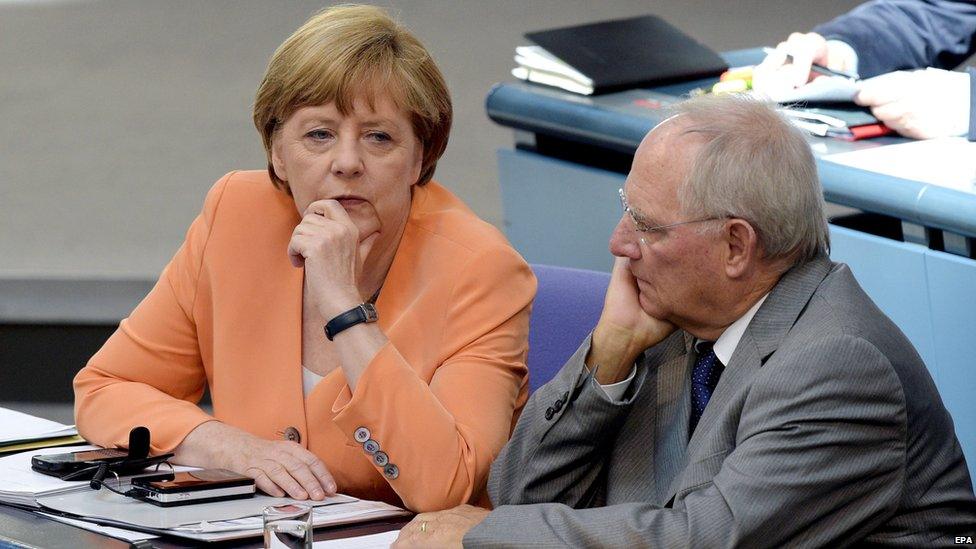Politics trumps economics in Greek debt crisis
- Published
Watch Katya Adler's report
So Alexis Tsipras has spoken.
Across Athens Greeks had been glued to their television sets to see him, along with crowds of journalists parachuted in here of late, desperately trying to follow the nebulous twists and turns of the story.
I can only imagine the expression that might have been on German Chancellor Angela Merkel's face if she was settled in front of her TV.
I doubt that she was smiling.
Prime Minister Tsipras raged at Europe and its leadership, accusing them of being autocratic and anti-democratic.
This, the same day that headlines here and across the world screamed of Mr Tsipras's "complete capitulation" to his creditors' demands, after the leaking of his letter last night to eurozone finance ministers.
In that letter he agreed to many of the bailout extension conditions, dismissed by him just a few days ago as attempts to humiliate Greece.
In fact, Mr Tsipras did not agree to all the creditor demands, though he made significant concessions. But according to EU officials the gap still amounted to hundreds of millions of euros. And - importantly - the letter was sent:
After the offer of an extension was no longer on the table - because the bailout deal itself expired on Tuesday night (30 June)
Despite Angela Merkel clearly saying there would be no more serious negotiations with Greece before the 5 July referendum
Confused? You are not alone.
It's worth remembering that what's happening now in the fast-moving Greek narrative is as much about politics as economics.

Chancellor Merkel and finance minister Schaeuble have spent years wrestling with the Greek debt dilemma
Domestic pressures
Many of the politicians involved take actions and make statements on Greece and its future in the eurozone but are really aiming their message at their domestic audience.
Mrs Merkel, for example, is keen to be seen as tough on Greece now.
She's long been portrayed as taking a softer line than her stern finance minister Wolfgang Schaeuble - and that may well reflect her personal view. She wants to maintain eurozone cohesion and keep Greece inside the currency if she can.
But German taxpayers are fed up with their money being "thrown" at Greece, as they see it.
And Mrs Merkel is known to keep a very close eye on opinion polls.
She's also very aware that her political brothers in centre-right parties governing Spain, Portugal and Ireland face general elections in the coming months.
They accepted tough austerity measures at home when their economies hit crisis point.
If they accept far more lenient terms for Greece, they'll be political toast.

Vote No - but keep euro?
As for Alexis Tsipras, it's conceivable that sending a "capitulation letter" to his eurozone colleagues but then berating them - and the way Europe is currently run - on Greek public television, a couple of hours before those colleagues were to discuss Greece by phone, indicates that his actions, too, were focused on the Greek people ahead of Sunday's referendum.
Mr Tsipras was unequivocal in his televised address.
He said the "very conservative banking circles" and the "sirens of destruction" of Europe were calling on voters to say Yes to everything, but offering no way out of Greece's crisis.
He called on Greeks to vote No on Sunday, "to address (Greece's) humanitarian crisis".
He said a No vote would put pressure on Europe to agree a better deal for Greece, and he insisted again that a No vote did not mean a No to Europe or a No to staying in the euro.
But many of his fellow Greeks and European counterparts are of quite a different opinion.